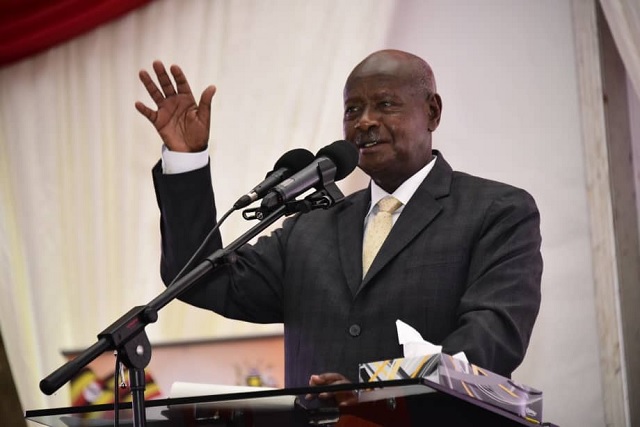
Kampala, Uganda | THE INDEPENDENT | President Yoweri Museveni has challenged the Convention of African Judiciaries on Human Rights to treat issues of human rights violations as secondary to more pressing African challenges.
Museveni said Africa is grappling with two fundamental challenges related to the growth of economies, oppression of mankind by nature and the oppression of mankind by fellow man.
He said that nature is oppressing mankind in terms of floods, droughts, earthquakes and diseases. According to Museveni, these issues should be at the heart of man’s priorities as opposed to human rights violations manifested through colonialism, dictatorship, slave trade and other forms of violations.
Museveni argued that human rights violations should be addressed under proper contexts which consider the fact that Africa missed the opportunity for growth in three past industrial revolutions. He was speaking at the opening of the fourth African Judicial dialogue on the Roles of Judiciary in tackling contemporary human rights issues in Africa at the Commonwealth Resort Munyonyo.
He said the primary goal of African judiciaries should be in facilitating economic growth for job creation, integration, infrastructure and promotion and the protection of civic and economic rights to food, education, jobs and health.
Throughout the President’s 48 minute speech, delegates listened attentively as the same message is translated into French and Portuguese with occasional clapping and cheering. He emphasized that some Human rights issues should be treated as an opportunity cost for development to prevent impunity from thriving on the continent.
Ambassador Thomas Kwesi Quartey, the Deputy Chairperson of the African Union Commission said that as African judiciaries implement Agenda 2063 for creating the Africa we want, there is strong need to recognize the challenges faced by the continent.
“This requires us to focus our eyes on how best to advance rights that address underdevelopment, poverty, inequality, marginalization and exclusion in our continent as we make concerted efforts towards effective implementation of agenda 2063” he stated.
Justice Sylvain Ore, the President of the African Court on Human and People’s Rights applauded the Ugandan parliament for leading the way in the promotion and protection of human rights through various legal instruments including the Prohibition of Female Genital Mutilations Act, Anti Money Laundering, Domestic Violence Act and the Equal Opportunities Commission Act. among others.
Justice Ore said the judicial dialogue is the most important judicial round table in the Continent for sharing jurisprudence, experiences and interests in the common cause for human rights and democracy. Uganda’s Chief justice Bart Katureebe said that the government is committed to building the Judiciary into a beacon of justice and democracy for the protection and promotion of Human rights.
The African Judicial Dialogue is a biennial platform for African judiciaries to interact with each other, share experiences and discuss pressing contemporary issues affecting human rights on the continent.
This time, they are discussing the roles of Judiciary in Africa in tackling contemporary Human Rights Issues such as Migration, Internal Displacement and Refugees, terrorism and protection of human rights, the right to Nationality, Statelessness in Africa, election petitions and human rights as well as Development and the rights of indigenous people.
The three-day high-level summit brings together Presidents of Supreme Courts of Africa, Chief Justices, Principal Judges and Constitutional and Supreme Court judges as well as members of Parliaments, government ministers and the diplomatic corps from the European and American Courts for human rights.
At the end of the meeting, an action plan for addressing some of the above issues will be adopted for implementation in the 33 member states that have ratified the protocol which established the African Court on Human and People’s Rights.
*****
URN
 The Independent Uganda: You get the Truth we Pay the Price
The Independent Uganda: You get the Truth we Pay the Price



